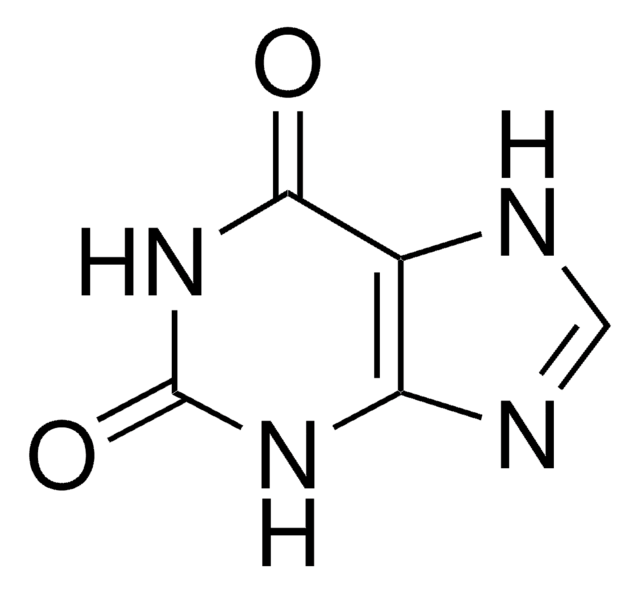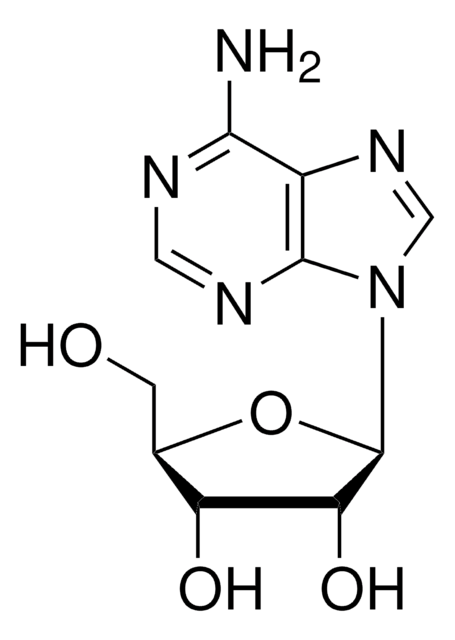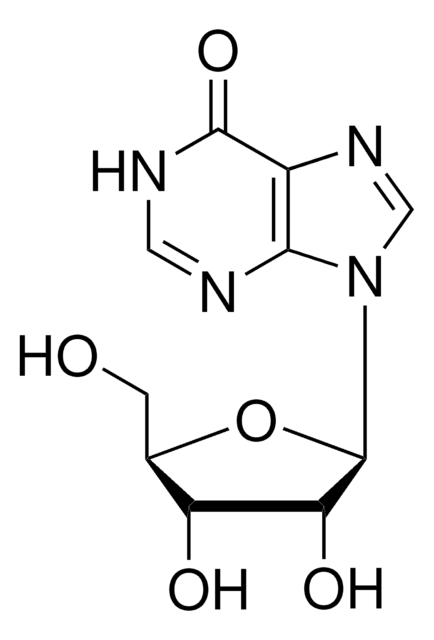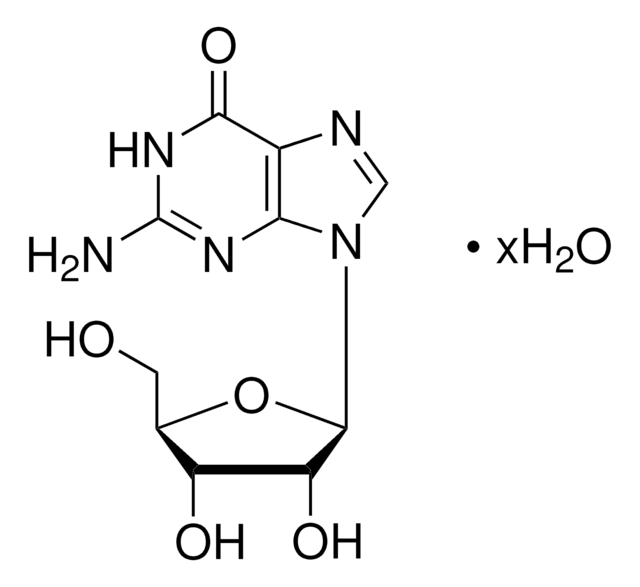I1782
Inosine Monophosphate Dehydrogenase Type II human
recombinant, expressed in E. coli
Synonym(s):
IMP:NAD oxidoreductase, IMPDH II
Sign Into View Organizational & Contract Pricing
All Photos(1)
About This Item
MDL number:
UNSPSC Code:
12352204
NACRES:
NA.54
Recommended Products
recombinant
expressed in E. coli
Quality Level
form
solution
specific activity
≥0.05 units/mg protein
mol wt
~55 kDa
packaging
vial of ≥0.002 unit
UniProt accession no.
relevant disease(s)
cancer
shipped in
dry ice
storage temp.
−70°C
Gene Information
human ... IMPDH2(3615)
Related Categories
General description
Inosine Monophosphate Dehydrogenase Type II (IMPDH2) is a ubiquitously expressed dominant isoform during developmental stages. IMPDH2 gene is mapped to human chromosome 3p21.31.
Application
Inosine Monophosphate Dehydrogenase Type II human has been used to test the inhibitory effect on vacor adenine dinucleotide (VAD) on its dehydrogenase activity.
Biochem/physiol Actions
Inosine Monophosphate Dehydrogenase Type II (IMPDH2) binds to adenosine triphosphate (ATP) and guanosine triphosphate (GTP). It catalyzes the formation of xanthosine monophosphate from inosine monophosphate in the presence of nicotinamide adenine dinucleotide (NAD). IMPDH2 elevated levels in tumors are correlated to its rate-limiting activity in guanosine monophosphate (GMP) synthesis. High levels of IMPDH2 is implicated in glioblastoma (GBM). It is regarded as a potential therapeutic target against tumors, antiviral, and immunosuppression-related pathologies.
Type II is the predominant IMPDH isoform and is specifically linked to a wide range of cancers and lymphocyte proliferation.
Unit Definition
One unit will produce 1.0 μ mole of XMP from IMP with corresponding reduction of β-NAD per minute at pH 8.0 at 25 °C.
Physical form
Solution in 20 mM Tris-HCl, pH 8.0, containing 0.5 mM EDTA and 1 mM DTT.
related product
Product No.
Description
Pricing
Storage Class Code
12 - Non Combustible Liquids
WGK
WGK 1
Flash Point(F)
Not applicable
Flash Point(C)
Not applicable
Personal Protective Equipment
dust mask type N95 (US), Eyeshields, Gloves
Certificates of Analysis (COA)
Search for Certificates of Analysis (COA) by entering the products Lot/Batch Number. Lot and Batch Numbers can be found on a product’s label following the words ‘Lot’ or ‘Batch’.
Already Own This Product?
Find documentation for the products that you have recently purchased in the Document Library.
Magdalena Makowska-Grzyska et al.
Biochemistry, 51(31), 6148-6163 (2012-07-14)
Inosine 5'-monophosphate dehydrogenase (IMPDH) catalyzes the first unique step of the GMP branch of the purine nucleotide biosynthetic pathway. This enzyme is found in organisms of all three kingdoms. IMPDH inhibitors have broad clinical applications in cancer treatment, as antiviral
Flavia Schmidt et al.
Archives of toxicology, 87(2), 361-370 (2012-08-24)
Mycophenolic acid (MPA) is an immunosuppressive agent that acts as a selective, non-reversible inhibitor of the enzyme inosine-5'-monophosphate dehydrogenase (IMPDH). Malformations have been described in children after maternal exposure to mycophenolate. However, the causal link is unclear in most cases
Veeraraghavan Usha et al.
PloS one, 7(3), e33886-e33886 (2012-04-06)
Tuberculosis (TB) remains a leading cause of mortality worldwide. With the emergence of multidrug resistant TB, extensively drug resistant TB and HIV-associated TB it is imperative that new drug targets be identified. The potential of Mycobacterium tuberculosis inosine monophosphate dehydrogenase
Magdalena Malachowska-Ugarte et al.
European journal of medicinal chemistry, 54, 197-201 (2012-05-25)
Hybrid pharmacophore anti-proliferative compounds, comprised of mycophenolic acid (MPA) and 1-nitroacridine/4-nitroacridone derivative have been synthesized and evaluated as inhibitors of five different leukemia cell lines (Jurkat, Molt-4, HL-60, CCRF-CEM, L1210) and human peripheral blood mononuclear cells from healthy donors. These
Chetan P Shah et al.
Journal of enzyme inhibition and medicinal chemistry, 33(1), 972-977 (2018-05-25)
Human inosine 5'-monophosphate dehydrogenase 2 (hIMPDH2), being an age-old target, has attracted attention recently for anticancer drug development. Mycophenolic acid (MPA), a well-known immunosuppressant drug, was used a lead structure to design and develop modestly potent and selective analogues. The
Our team of scientists has experience in all areas of research including Life Science, Material Science, Chemical Synthesis, Chromatography, Analytical and many others.
Contact Technical Service






